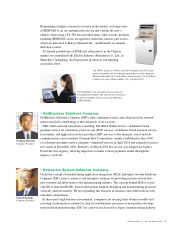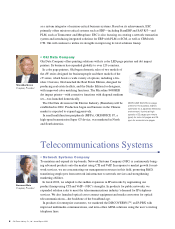Oki 2002 Annual Report Download - page 18
Download and view the complete annual report
Please find page 18 of the 2002 Oki annual report below. You can navigate through the pages in the report by either clicking on the pages listed below, or by using the keyword search tool below to find specific information within the annual report.
Oki Electric Industry Co., Ltd. Annual Report 200216
Operating Results
Overview
In fiscal 2002, ended March 31, 2002, global economic conditions
became severe, largely owing to declines in IT investment and
demand, and worsened following the September 11 terrorist attacks
in the United States. In early fiscal 2002 there were signs Japan was
heading toward a self-sustaining recovery, and the economy was
widely expected to emerge from recession. The global economic
slowdown, however, led to drops in imports and production, while
uncertainly about future economic prospects impacted on the ability of
companies to make capital investment decisions. In addition, employment
uncertainties dampened personal consumption and deflation continued,
making for another year without economic improvement.
Oki’s business environment was harsher than expected, and was
characterized by a slump in the global semiconductor market brought
on by a drop in demand for PCs and mobile telephones, as well as
drastic retrenchments in investment and demand in both Japan’s and
North America’s telecommunications markets. In these market condi-
tions, we established the revised medium-term management plan
Phoenix 21 Sky-High and set aside fiscal 2002 as the preparatory
year before implementation of the reforms that will make Oki a high-
growth company. The unexpectedly severe market environment,
however, temporarily hurt revenues.
Net Sales
Owing to factors outlined above, net sales—particularly of telecom-
munications systems and electronic devices—dropped 18.3%, to
¥604,572 million.
Cost of Sales, Selling, General and Administrative Expenses
and Income
Cost of sales dropped ¥73,111 million, or 13.0%, to ¥490,257 mil-
lion. Although we took measures to expand overseas production and
cut fixed expenses, the fall in semiconductor prices hurt the cost of
sales ratio, raising it from 76.1% to 81.1% as a percentage of net
sales. Gross profit fell 35.4%, to ¥114,314 million, reducing the
gross profit margin five percentage points, to 18.9%.
Selling, general and administrative (SG&A) expenses fell ¥7,005
million, or 4.7%, to ¥141,562 million, owing to greater selectivity
in R&D investment and cuts in ordinary expenses. The Company
recorded a ¥27,247 million operating loss, compared with operating
income of ¥28,314 million in fiscal 2001, caused by lower sales and
the fall in semiconductor prices, and a net loss of ¥34,077 million,
compared with net income of ¥8,944 million. This was reflected in
net loss per share of ¥55.66, from net income per share of ¥14.61 in
the previous year.
2001 20022000 2001 20022000 2001 20022000
Net Sales and Operating Income (Loss)
(Millions of yen)
Selling, General & Administrative (SG&A) Expenses and
SG&A Expenses to Net Sales
(Millions of yen) (%) (%)
Net Income (Loss) and Return on Equity (ROE)
(Millions of yen)
669,776 740,250
604,572
163,887 184,704 163,523
13,804 28,314
–27,247
21.3% 20.1%
23.4%
1,146
8,944
–34,077
SG&A Expenses
SG&A Expenses to Net Sales
Net Income (Loss)
ROE
Net Sales
Net Sales (Overseas Sales)
Operating Income (Loss)
0.8%
6.1%
–26.4%
–200,000
0
200,000
400,000
600,000
800,000
0
30,000
60,000
90,000
120,000
150,000
0
8
16
24
32
40
–40,000
–30,000
–20,000
–10,000
0
10,000
–40
–30
–20
–10
0
10
142,570 148,567 141,562
FINANCIAL REVIEW
























